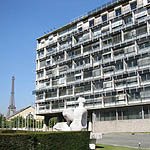Headquarters

"SINCE WARS BEGIN IN THE MINDS OF MEN..., it is in the minds of men that the defenses of peace must be constructed." From the preamble of UNESCO's Constitution
UNESCO is celebrating its six decades of work this year. The U.S. National Commission for UNESCO, in its meeting next week, is devoting a session to the commemoration. It seems appropriate to editorialize about the UNESCO adventure at this moment.
UNESCO was created by the Allies, working in a bombed out London, at the end of World War II. It is not surprising that UNESCO’s mandate was “to contribute to peace and security by promoting collaboration among the nations through education, science and culture.”
As the membership of UNESCO expanded to more than 190 nations, UNESCO’s leadership came to recognize that -- as important as the maintenance of peace is -- there is a still greater objective for UNESCO. We have come to understand that development too begins in the minds of men, and it is in the minds of men that progress in all fields must be constructed. I suggest that UNESCO’s broader mandate is to promote social, political and economic development through education, science and culture!
I believe that UNESCO promotes a set of values, and that the global penetration of these values is indeed transforming the world, leading to peace and progress. These values include:
§ Concern for the poor
§ Love of peace
§ Emphasis on ethical behavior informed by philosophy
§ Respect for learning
§ Love of the written word
§ Respect for cultural diversity, and joy in cultural riches
§ Enthusiasm for the global dissemination of new media
§ Freedom of information
§ Respect for and love of scientific knowledge
§ Respect for knowledge based policies
§ Respect for the tangible and intangible cultural heritage of mankind
§ Respect for and love of the natural heritage of mankind
§ Respect for nature and concern for the environment
Certainly UNESCO can not transform the world alone, but it has played an important role in the global dissemination of these values. Its thousands of workers and myriad programs spread these values, and indeed the prestige of UNESCO itself helps to promote these values. UNESCO helps catalyze the efforts of governments, academia, the scientific community and civil society all over the world.
Indeed, were there not an international forum such as UNESCO for the discussion and debate of these fundamental values, I think we would have to create one complementary to but separate from the General Assembly and Councils of the United Nations.
I am proud that Americans were leaders in the creation of UNESCO, and pleased that we are again leaders in the governing councils of the organization. I hope and believe that the promotion of these values is fundamental to American national policy.